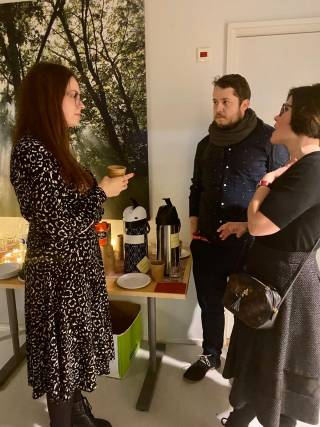We collected experiences of earlier GTS students about the programme and their careers. We were curious about the programme’s advantages in their professions and in their personal lives.
To sum it up, many of our ex-students have found their place (but not all of them, of course). Here’s a short list about that: we have someone who works at the British Embassy as trade adviser, someone who is project director at a housing marketing & interior designs company, an ex-student is specialist at Public Employment and Business Services, another one works as multicultural trainer with MOK (YMCA). Other students have continued their academic work, a graduate student from GTS now is doctoral student at the University of Eastern Finland in the department of Geographical and Historical Studies with a specialization in human geography, and we have Dissertation Researcher in Sociology and PhD student at our university.
Here are some of the answers for our question about professional use of studies in GTS:
“I do not use sociological knowledge directly in my work. However, it helps to understand and anticipate different phenomena, including the dynamics of trade negotiations.”
“The GTS program equipped me for my doctoral studies. It offered a possibility for students to participate in a research seminar where researchers discussed their work. Participating in the seminar explained to me how different research stages look like and how research proposals are written. The program further helped me develop a critical and analytical way of thinking. During discussion sessions in the seminars, I learned how to approach a topic through various methodological and theoretical lenses. (…)”
“My work has little relation to my studies, though I guess a sociological viewpoint is always useful in some ways, mostly in that I can better understand the organizational practices and empathize with the situations of the people that I serve in my work.”

“To be honest the straight away answer to your question is a big NO. Although I have learnt a lot from GTS studies but that is all theoretical and Finnish job market is not that international enough to cater these theories especially in the social field. I have worked in different intervals with Vantaa and Helsinki kaupunki (city) related work and I found it a bit outdated and not utilizing any new research especially where immigrants work is concerned. Private market is a bit better, but GTS is something which I haven’t seen materialize much in full throttle. In bits and pieces, I see some parts sometimes like domestication of international ideas and scripts used by media but that is not necessarily push you towards using it in the profession.”
“GTS is not related to my current profession. Although, my international master’s degree contributed to get this director position straightaway.”
What about personal development? Here are some answers:
“All degrees provide valuable insights. The perspective of this particular programme is rather unique, and therefore it does allow one to bring fresh and informed insights into different discussions.”
“Yes, it does as studying for a Master’s degree, in general, requires you to developed your organizational and analytical skills. In addition, the program gave me the skills to view critically, political discourse, and justifications for government policies and to understand them in a more international and global context.”
“I would say that GTS has opened my mind and give me new directions to analyse the international phenomena and the intricacies of transnational policies on the micro as well as macro level. This was something totally new for me and polished my critical thinking in the ways I didn’t know before. After saying that I would also like to say that employability of this degree is still very confusing.”
“I think that yes, it has made a difference that I studied in the programme. I have now a better knowledge of different theories of how, for example, ‘development’ is viewed, depending on the chosen approach. I also understand better how issues can be framed differently and can hence read the news and listen to people with a more critical approach than before. Even though I wish I would have gained even more tools to analyse phenomena and for them to be more concrete, I think I the programme still developed my thinking in many ways.”
“I got many good friends during my studies, I received opportunities that I otherwise would probably have missed (which had an impact on me), and my intellectual curiosity increased a lot, so I’d say yes, it did.”
